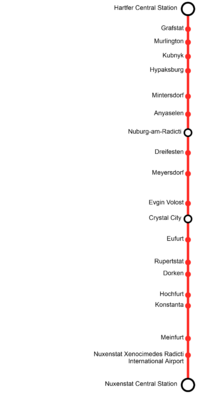Nuxenstat-Hartfer Main Line: Difference between revisions
Radictistan (talk | contribs) mNo edit summary |
Radictistan (talk | contribs) m (→Infrastructure) |
||
| Line 59: | Line 59: | ||
==Infrastructure== | ==Infrastructure== | ||
Because of the high speed of many of its operating services and the density of the traffic, the Nuxenstat-Hartfer Main Line is maintained at a high level, both by Radictistani and international standards. Radictistani railway regulations specify that all trains operating at or greater than 160 km/h be equipped with functioning | Because of the high speed of many of its operating services and the density of the traffic, the Nuxenstat-Hartfer Main Line is maintained at a high level, both by Radictistani and international standards. Radictistani railway regulations specify that all trains operating at or greater than 160 km/h be equipped with functioning {{wp|Cab_signalling|in-cab signal}} equipment and {{wp|Automatic_train_stop|automatic train stop}}. The entire NHML route is fitted with these functionalities. The fastest sections of track, those capable of supporting 220 km/h service, are mostly found south of Crystal City and between the towns of Evgin Volost and Dreifesten. The remainder of the track is certified for speeds between 160 and 200 km/h. | ||
===Track=== | ===Track=== | ||
The NHML is either double or quadruple-tracked depending on location. The quadruple track allows slower freight or passenger trains to use the line without disrupting the Intercity Express services which are the line's main hallmark. | The NHML is either double or quadruple-tracked depending on location. The quadruple track allows slower freight or passenger trains to use the line without disrupting the Intercity Express services which are the line's main hallmark. {{wp|Level_crossing|Level crossings}} have been eliminated on sections of track which permit maximum speeds but some remain at other locations. | ||
===Electrification=== | ===Electrification=== | ||
The entire line is electrified with overhead wires at | The entire line is electrified with overhead wires at {{wp|15_kV_AC_railway_electrification|15 kV AC}}. | ||
==Services== | ==Services== | ||
Revision as of 04:58, 26 February 2020
| Nuxenstat-Hartfer Main Line | |||
|---|---|---|---|
| Overview | |||
| Type | High-speed rail Inter-city rail Commuter rail | ||
| System | Royal Radictistan Railways Nuxenstat Metropolitan Transit Authority | ||
| Status | Operational | ||
| Termini | Nuxenstat Central Station Hartfer Central Station | ||
| Stations | 20 | ||
| Operation | |||
| Owner | Royal Radictistan Railways | ||
| Technical | |||
| Track gauge | 1,435 mm (4 ft 8 1⁄2 in) standard gauge | ||
| Operating speed | 220 km/h (140 mph) | ||
| |||
The Norucst-Hartfer Main Line is an electrified rail line between the Radictistani cities of Nuxenstat and Hartfer. It is the fastest rail line in Radictistan, allowing travel at up to 220 km/h, qualifying it as a high speed line according to international standards. It is operated by the Northern Region of Royal Radictistan Railways.
Services on the line includes both day and night trains. Day services are operated as both regular Intercity and as Intercity Express consists. The Intercity Express trains serve fewer stops and operate at higher average speeds. Sections of the line within Greater Nuxenstat are utilized for commuter services operated by the Nuxenstat Metropolitan Transit Authority. The line is quadruple-tracked in many places to facilitate this integration of express and non-express services.
Geography
The Nuxenstat-Hartfer Main Line generally follows the Radicti River on its way north and is favored by flat terrain from Nuxenstat until it reaches the Norcustsur county line when the land becomes more mountainous. Numerous tunnels were dug during the construction of the line to allow trains to maintain speed on that last leg of the northbound journey. In most other places the line was built to follow natural contours. The radius of the line's curves are now the main obstacle to further upgrades.
Infrastructure
Because of the high speed of many of its operating services and the density of the traffic, the Nuxenstat-Hartfer Main Line is maintained at a high level, both by Radictistani and international standards. Radictistani railway regulations specify that all trains operating at or greater than 160 km/h be equipped with functioning in-cab signal equipment and automatic train stop. The entire NHML route is fitted with these functionalities. The fastest sections of track, those capable of supporting 220 km/h service, are mostly found south of Crystal City and between the towns of Evgin Volost and Dreifesten. The remainder of the track is certified for speeds between 160 and 200 km/h.
Track
The NHML is either double or quadruple-tracked depending on location. The quadruple track allows slower freight or passenger trains to use the line without disrupting the Intercity Express services which are the line's main hallmark. Level crossings have been eliminated on sections of track which permit maximum speeds but some remain at other locations.
Electrification
The entire line is electrified with overhead wires at 15 kV AC.
Services
Passenger
The Nuxenstat-Hartfer Main Line is used by both Intercity and Intercity Express trains of Royal Radictistan Railways. The latter are the fastest rail services in Radictistan utilizing the line's maximum operational speed of 220 kilometers per hour. ICE services stop only three times along the route, at the Nuxenstat airport, Crystal City, and Nuburg-am-Radicti. Intercity trains operate at 160 kilometers per hour and stop at most stations along the route. These include the famed Intercity Night sleeper trains. Sections of the line just north of and within Nuxenstat are used by commuter trains operated by the Nuxenstat Metropolitan Transit Authority.
Freight
The NHML sees considerable freight traffic, especially at night when there are fewer passenger trains on the line. Because of the overhead electrification system, intermodal containers cannot be double stacked as they are on some eastern non-electrified lines. This restricts the amount of freight which can carried on the line.
